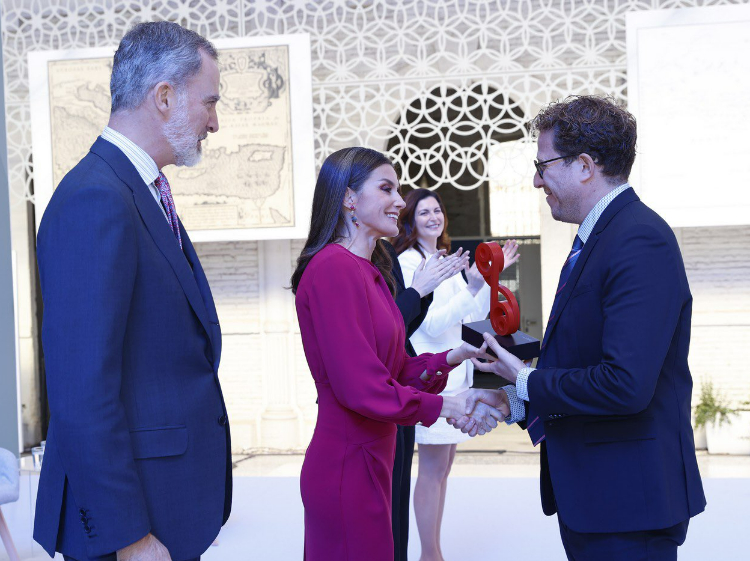
Guillermo Mínguez Espallargas, Associate Professor at the University of Valencia and group leader of Crystal Engineering Lab (CEL) at the Institute of Molecular Science (ICMol), has received the 2022 Maria Teresa Toral National Research Award for Young People 2022 granted by the Ministry of Science in the area of Chemical Science and Technologies.
For the first time these awards have included the distinction for young people under the age of 40. In the case of Guillermo Mínguez (Seville, 1981), winner of the María Teresa Toral prize, "the originality, potential and impact of his contributions to the synthesis of compounds with novel physical properties and functionalities" have been recognised.
The award ceremony took place at the Casa Mediterráneo headquarters, which was attended, in addition to the King and Queen and the minister, by authorities headed by the President of the Valencian Regional Government, Ximo Puig, and the Government Delegate, Pilar Bernábe, as well as family members, friends and representatives of the scientific community in Spain.
During the awards ceremony, His Majesty King Felipe VI encouraged the award winners to "maintain their passion and vocation for science". The King emphasised that, four decades after the birth of these awards, a "broad chain of value" has been deployed, the solidity of which is sustained by researchers and groups with work "whose effects may be more or less immediate and whose impact may be greater or lesser, but all have the vocation to do something important".
In Felipe VI's opinion, research "is fundamental because of the results, but also because of the processes, the methods and the learning that it involves, since everyone adds knowledge, sometimes in an unforeseen way". And he stressed: "You cannot approach a transformation of the country without basing it on science and knowledge".
For her part, the Minister of Science and Innovation, Diana Morant, highlighted the importance of these researchers in positioning Spain at the forefront of world scientific production, stressing that science is a hope for the future.

Mínguez graduated in Chemical Sciences from the University of Seville in 2004, with an Extraordinary Prize. Subsequently, in 2007, he obtained his PhD at the University of Sheffield (UK) under the supervision of Professor Lee Brammer. He is currently co-leader of the Crystal Engineering Lab (CEL) research group, which focuses on the development of molecular materials that form porous networks, as well as the synthesis of new two-dimensional materials analogous to graphene.
The award-winner joined ICMol in 2008, where he trained in molecular magnetism with Professor Eugenio Coronado, professor of Inorganic Chemistry at the UV and director of the centre. There he started a new line of research combining his previous experience in crystalline engineering and the knowledge acquired in magnetism to develop magnetic coordination polymers with dynamic behaviour.
Guillermo Mínguez leads, as a guarantor researcher, the strategic line Metal-Organic Frameworks (MOF) of the María de Maeztu programme for units of excellence granted to ICMol by the Ministry of Science in recognition of the scientific results of the institute, located in the Science Park of the University of Valencia. ICMol has been a María de Maeztu Unit of Excellence since 2015 and renewed this accreditation in 2019.
It has obtained European funding, through a grant from the European Research Council (the prestigious ERC Consolidator Grant), but also leads or participates in national and regional projects or with companies.
Mínguez's career has already accumulated several prestigious awards, such as the Princess of Girona Foundation Award in Scientific Research; the Young Researchers Award of the Spanish Royal Society of Chemistry; the Dalton Young Research Award of the Royal Society of Chemistry and the Gold Medal of the European Young Chemist Award.


